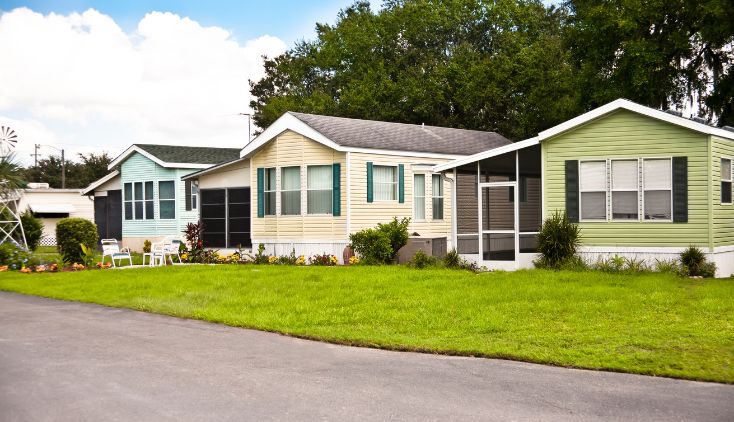Understanding Mobile vs. Manufactured Homes
If you’re looking to buy a new home and are open to considering a mobile or manufactured home, then look no further. Read on to discover the differences between mobile homes vs. manufactured homes and the advantages and disadvantages of each.
Mobile Homes
The definition of a mobile home varies, so let’s explore those variations and reach a conclusion about exactly what a mobile home is.
What Are Mobile Homes?
Advancements in the mobile home market came as a result of more and more people moving around the country for work. Initially, mobile homes were on wheels, could be attached to a car and were easily transported between locations. However, mobile homes in this style were banned in 1976 as a result of the Mobile Home Construction and Safety Act. Most subsequently lost their wheels and, with them, the ability to move from place to place with ease.
The 1976 policy also stipulated that mobile homes should start to be termed manufactured homes, acknowledging that they’d no longer be moveable in quite the same way. Other interpretations point to campervans, RVs and motorhomes as examples of mobile homes - and for this article, we’ll use that definition.
The Advantages of Mobile Homes
While many mobile homes are now considered manufactured homes, you can still classify campervans, RVs and motorhomes as mobile homes. The advantage of these living spaces is that they are easy to move. Each includes a steering wheel, meaning they can be driven across the country. You can even take them across the ocean and around the world.
Mobile homes allow you to move quickly, depending on your situation. This makes them an ideal choice for people who regularly have to move for work or nomads who don’t want to stay in one place for too long.
The Disadvantages of Mobile Homes
Unfortunately, mobile homes - due to their ability to be moved by non-professionals - aren’t incredibly spacious. Owing to them being driven on roads, they can only be a certain width, which greatly limits the possibilities for design and innovation. This lack of space means it’s hard to build up a collection of belongings, and replacing furniture is a lot more hassle than in a conventional house.
Mobile homes are becoming increasingly expensive too. Due to their increasing popularity, manufacturers are charging more for high-end models. Plus, they cost a lot to upkeep because of the number of miles they do.
Manufactured Homes
Manufactured homes are becoming increasingly popular in the United States, but what are they, and are they worth investing in?
What Are Manufactured Homes?
Manufactured homes came into existence in 1976 as a result of the Mobile Home Construction and Safety Act. New rules and regulations in the industry birthed this new type of home. Unlike mobile homes, they have far greater protection and safety features, including insulation, electricity and plumbing. They are significantly safer than their mobile home counterparts, having stricter fire safety features, too.
For a property to be deemed a manufactured home, it must be more than eight feet in width and 40 feet in length. It also must be transportable, but this is done by professionals. Custom home builders build manufactured homes off-site in a factory, warehouse or outdoor building site. Once completed, they are moved to the required location and placed on a ground framework.
The Advantages of Manufactured Homes
Manufactured homes are customizable. The home design you choose is almost entirely up to you. How much you can customize them varies from company to company, but some offer vast options for you to choose from. You can pick your preferred flooring, finishes, kitchen features, bathroom features and more. This is perfect because it allows you to have a manufactured home designed to your specific style and requirements. Such customization is especially beneficial for those with a disability.
Due to how they are built, it’s also easy to add to manufactured homes over time. A new family may start small and add factory-built additional rooms over time.
Manufactured homes are considerably cheaper than traditional homes — sometimes up to four times cheaper for a property of a similar size. New manufactured homes sell for around US$123,000. Despite being cheaper, they’re still governed by in-depth safety regulations — meaning that manufactured homes have good structural strength.
The Disadvantages of Manufactured Homes
Manufactured homes are sadly not being built everywhere. The market remains smaller than the on-site house market, and it’s challenging to obtain one in rural parts of the United States.
Another disadvantage of manufactured homes is that many lenders don’t consider them as real estate but instead as personal property. This can make it challenging to obtain a loan to purchase a manufactured home.
Whether you get a mobile home or a manufactured home, you'll need cleaning supplies. Check out some of the top products.
